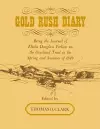
Gold Rush Diary
Thomas D Clark - Paperback
£43.50
Thomas D. Clark was the dean of historians of the Old Southwest. His more than thirty books were the product of six decades of research and writing.
John D. W. Guice, Professor of History, University of Southern Mississippi, and author of the Foreword, says of Everett Dick's The Dixie Frontier, that ""persons interested in the American heritage should read it because it is a 'people' book-one about the daily lives of Southern men, women, and children who pushed into the lands beyond the Appalachian Mountains.""|It is impossible to feel uncomfortable around Howard Lamar. This most genial of men immediately puts you at ease with a smile, an amusing story, and a genuine desire to know about you. Howard Lamar is, by nature, a family man - profoundly inclusive, supportive, and relational. Combine such qualities with Howard's broad intellectual scope and the humane sensitivity he brings to the study of the American West, and you begin to understand why generations of students, alumni, and colleagues have such affection for Howard and consider him to be Yale's first citizen and a national treasure.
Born into a family whose heritage included two members of the United States Supreme Court and the second president of the Republic of Texas, and raised in Alabama during the Depression, Lamar - in his Yale dissertation - brought a new sense of realism to a field of western history still somewhat hypnotized by the celebratory abstractions of Frederick Jackson Turner. Finding the frontier to be not as self-sufficient or democratic as Turner had claimed, Lamar, in that first book, Dakota Territory, 1861-1889, emphasized the critical role of the federal government in the economic survival and political development of a western region. Building upon such insights, Lamar's second book, The Far Southwest, 1846-1912: A Territorial History, added a fresh appraisal of the role of merchants in the process of frontier development. That book also stressed the agency of Hispanic leaders and cultural traditions in the West. Lamar would pursue the role of western merchants as flexible “phase capitalists” and breakers of the cake of custom in a later essay published as The Trader on the American Frontier: Myth's Victim. Other essays would stress the importance of women in the Gold Rush and other western movements, the persistence of Native Americans and other “culturally distinct enclaved groups,” and the paradox of bondage and other oppressive labor systems on various frontiers that held the promise of economic freedom.
In short, where Turner had painted a picture of solitary and faceless pioneers moving through a grand moral, and rather static, landscape, Lamar's historical vision included real men and women whose actions were encompassed by a variety of cultural, economic, social, and political institutions and contexts. Lamar's complex vision, personal generosity, and spirit of intellectual adventure inspired several generations of graduate students. By the time some of those students emerged in the 1980s as major new voices in the profession, creating what has been called the “New Western History,” it had become clear that Lamar, as both a historian and a mentor, had truly played a major role in transforming the field. Without ever rejecting the relevancy of Turner, Lamar has forced us to see the American West in comparative perspective and to view the frontier not simply as the birthplace of one nation but as a shifting space contested by a variety of nations, empires, and peoples. Because he has dared to tell the story of frontier expansion with all its warts and scars, Lamar had given us a West that is more relevant than ever. A historical landscape still populated by ordinary men and women caught in acts of national even global significance, the West remains a place of boundless fascination.
--Biography by Jay Gitlin